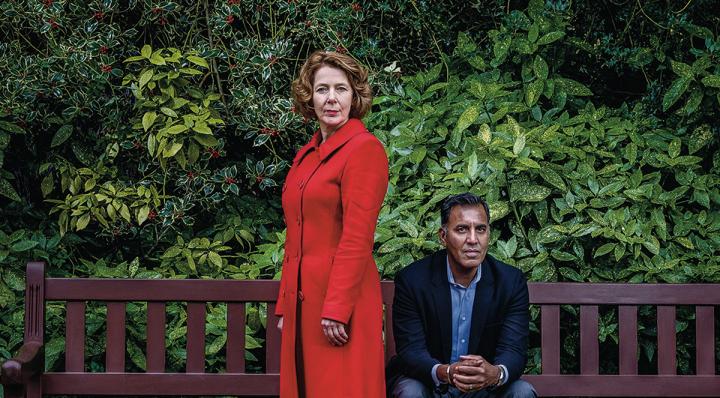Nurturing cultural relations across institutions
A new institute at the University is bringing together experts and enhancing cultural connections.

The University is home to a diverse range of cultures and nationalities across student, staff and academic spheres. Launched in January 2017, the Institute for International Cultural Relations aims to bring these groups and cultures together, both in academic and social circles throughout the University and beyond.
Connecting through culture
The Director of the Institute, Professor JP Singh, joined the University in 2016. A prize-winning author and former adviser to UNESCO, the World Bank and the World Trade Organization, Professor Singh believes a greater interdisciplinary approach to research and collaboration is required, if Edinburgh is to expand the impact of its expertise to a global audience.
“Culture is who we are and how we think of ourselves,” says Professor Singh. “There are many people at the University and beyond who work on different topics but use culture as a lens. The Institute for International Cultural Relations aims to bring these people together and foster research and education in terms of how we think of ourselves across borders.”
For Professor Singh, several things stand out about education in the future: “We will have to solve issues that can’t be categorised by discipline,” he explains. “For example, the refugee influx into Europe is a public health issue, a human rights issue, a legal issue and a diplomatic issue. It will take an interdisciplinary approach to help solve it.”
He also believes that universities must continue to adapt in order to deliver world-leading education and research: “I’ve been living in the US for the past 34 years, but I grew up in a remote area in India. When people came from big universities to lecture to us, we didn’t listen. So I’m always trying to find a way to connect the Institute to all types of communities and people from different backgrounds.”
Professor Singh has been working with a number of schools across the University to design cutting-edge online programmes, including the planning of an online masters in international cultural relations.
Global Cultural Fellows
The Institute has already presented a range of events in the UK and abroad. One such initiative was the Institute’s Global Cultural Fellows programme, which worked with a number of international groups to bring 33 cultural experts to Edinburgh for the 70th year of the Edinburgh festivals in the summer of 2017.
“The programme was a resounding success,” says Professor Singh. “It really resonated with people. I can’t believe the number of times so many of the Fellows have said that this was one of the most transformational experiences of their life.”
I’m always trying to find a way to connect the Institute to all types of communities and people from different backgrounds.
The diverse group included a dancer from Cambodia, the head of the National Theatre of Nigeria, an Australian opera singer, a Malaysian chef, and a magazine editor from Sweden. Over eight days the group met to discuss international cultural relations and specific issues before attending shows at the various festivals.
“We invited cultural activists from around the world, who are strongly connected to their communities, to think about specific cultural issues,” explains Professor Singh. “The experience had a profound impact on many of them and made them think of the world differently. Over the next year, the Fellows will undertake projects of their own choosing, which help them connect their Edinburgh experience with their communities, and of course, they now have a global network that they can rely on.”
The Institute has also been forging close relations with cultural partners. Professor Singh noted the invaluable input of the Edinburgh festivals to the Global Cultural Fellows programme: “We worked closely with various festivals to design the programme, taking in shows at the Book Festival, the Festival Fringe and the Edinburgh International Festival, which spawned further conversation and research. Integral to this activity was the input of our Visiting Professor Faith Liddell.”
As the founding Director of the organisation Festivals Edinburgh, Professor Liddell led on the development of Edinburgh’s twelve major festivals. The Global Cultural Fellows programme was one of her first projects in her new role with the Institute: “I had collaborated with a number of people in the University, in my role with Festivals Edinburgh,” explains Professor Liddell. “But when Vice-Principal Dorothy Miell suggested becoming a Visiting Professor I was delighted. The Institute feels like a natural home.”
The individual Global Cultural Fellows came from across the world, clearly with different and distinctive perspectives. They included people working on the frontline in conflict resolution, in community initiatives, in culture-led regeneration as well as radical artists pushing the boundaries of practice. For Professor Liddell, understanding international cultural relations is critical in the current environment: “Shared understanding of cultural interests and values across nations has been put into question,” she says. “Innovative approaches to developing and informing cultural practices are essential to bridging divides.”
Tackling world issues
Professor Singh also believes that culture is at the heart of many of the world’s most important issues. Therefore the city, the University and the Institute are ideally placed to bring together individuals, ideals and disciplines of contrasting natures in order to connect research, politics and communities. The Institute will have the opportunity to explore this concept further as one of several key research groups within the University’s new Edinburgh Futures Institute – a visionary hub where experts can transcend boundaries and join forces in response to global cultural, technological, political, social and managerial challenges.
“The past year in Edinburgh has provided a deeply meaningful and exciting opportunity to make an institutional mark in international cultural relations,” states Professor Singh. “We’ve had great support from the Scottish and Westminster governments, from the Edinburgh festivals and from people all over the world, and to feel that you are really making a difference in the world, as an institute, really resonates so much.”
Photo © Tricia Malley Ross Gillespie www.broaddaylightltd.co.uk

